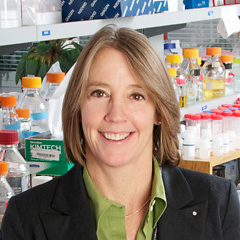Molecular Neurodegeneration
14–18 January 2019
Wellcome Genome Campus, UK
Overview of the molecular basis of neurodegenerative disorders and introduction to bioinformatic approaches relevant to neurology
Summary
This course provides an overview of the molecular basis of neurodegeneration and the development of therapeutic intervention to combat neurodegenerative disorders. The programme will cover several neurological disorders including Alzheimer’s disease, Parkinson’s disease, Huntington’s disease, Fragile X, Spinocerebellar ataxia and amyotrophic lateral sclerosis. It will highlight experimental techniques used in neurogenetics and stem cell research. The course will provide an introduction to bioinformatic approaches relevant to neurology, including genome-wide association studies.
Participants will gain an insight into the current understanding of both rare and common neurological disorders, the strengths and weaknesses of experimental approaches and evidence, and how this knowledge can be applied to develop therapies.
The programme is aimed at individuals working in neurodegenerative research, neurogenetics or translational neuroscience, including clinical scientists, veterinary scientists, PhD students and post-doctoral researchers. We encourage applications from researchers based in the pharmaceutical and biotechnology industries. Applications from those who have completed a PhD in another area and have moved into neuroscience for their postdoctoral studies will also be considered.
The course will benefit researchers who seek a comprehensive view of neurodegenerative disorders together with state of the art research techniques, and who wish to gain a new perspective on their own studies. The intensive programme provides the opportunity to interact with leading neuroscientists. To optimize discussions and interactions, numbers are limited to 30 students.
Learning outcomes
After attending this course, participants will be able to:
- Describe in detail the process of neurodegeneration
- Discuss and contrast different neurodegenerative disorders
- Critique the impact and limitations on the use of big data in the field of neurodegeneration
- Interpret and communicate the findings of genomics studies from single cells to large populations
- Critically evaluate the advantages and disadvantages of varying disease models, from fly models to patient-derived iPSCs
- Describe recent advances in therapeutic and translational areas to prevent and treat neurodegenerative diseases
- Apply concepts learned on the course to your own research project
Programme
The course will start at approximately 12.00 on Monday, 14 January and close at approximately 16.00 on Friday, 18 January 2019.
The programme is lecture-based but highly interactive. Participants will have the opportunity to share their research with tutors, speakers and other students throughout the course, during the formal poster sessions and discussion sessions. Tutors are available throughout the course.
Topics will include:
- Clinical features of neurodegenerative disorders
- Pathological events in varying neurodegenerative diseases
- Cerebrovascular regulation in stroke
- Modelling neurodegenerative diseases from flies to iPSCs
- Bioinformatics and genome-wide association studies in neurodegenerative diseases
- Stress pathways in neurodegeneration
- Development of therapeutic approaches
This is a residential course. All students are requested to stay onsite for the full duration to benefit fully from discussions and interactions with the faculty and other students.
Instructors and speakers
Scientific Committee

Beverly Davidson
Children’s Hospital of Philadelphia & The University of Pennsylvania, USA

Rita Sattler
Barrow Neurological Institute, USA

Nicholas Wood
University College London, UK
Confirmed tutors
Nancy Bonini – University of Pennsylvania, USA
Valina Dawson – Johns Hopkins University, USA
Karen Duff – Columbia University, USA
Alexandra Durr – Pitie-Salpetriere University Hospital, France
Costantino Iadecola – Weill Cornell Medical College, USA
Huw Morris – University College London, UK
David Nelson – Baylor College of Medicine, USA
Selina Wray – University College London, UK
Yi Xing – Children’s Hospital of Philadelphia, USA
Advanced Courses and Scientific Conferences Team
Nicole Schatlowski, Scientific Programme Officer
Lucy Criddle, Conference & Events Organiser
How to apply
Fees
| Academic registration with accommodation | £750 |
| Commercial registration with accommodation | £1050 |
The fees include accommodation, meals and lectures for the duration of the course. The fee will be requested once acceptance is confirmed.
Accommodation
This is a residential course. All participants will stay at The Wellcome Genome Campus Conference Centre, Hinxton, Cambridge, for the nights of 14, 15, 16 and 17 January 2019.
If you wish to book onsite accommodation either side of the course dates, please contact the Conference Centre directly.
Application deadline: 6 November 2018
Places on this course are limited and will be awarded on merit. Applicants should be currently engaged in relevant research and will be required to complete an online application form. The selection process will take place in November 2018.
The following will need to be provided:
- Qualifications and justification for attendance
- A list of relevant publications
- An outline of current research
- Supervisor’s details: your supervisor will then receive an e-mail requesting a supporting statement to complete your application.
Please note: Applications cannot be considered without a supervisor’s supporting statement.
Travel visas
Please contact the event organiser if you require a letter to support a travel visa application. Note that letters will be provided to confirmed attendees.
Non-European Economic Area or Swiss nationals may be required to have a visa to enter the UK. Early application is strongly advised, as this process can take 6-8 weeks or longer.
Please visit the following websites for further information:
- UK Border Agency website: www.ukba.homeoffice.gov.uk/visas-immigration/
- Information for general visitors and business visitors: www.ukba.homeoffice.gov.uk/visas-immigration/visiting/business/business-activities/
Cost
A number of bursaries are available for dermatology trainees, PhD students and postdocs to attend this course.
- Bursaries provided by the British Association of Dermatologists (BAD) will cover the full expense of the course
- Bursaries provided by ACSC will cover up to 50% of the course fee
Please indicate in your application for which scheme you would like to apply for.
The following documents will need to be provided:
- CV
- A justification letter from applicant
- A supporting letter from supervisor stating financial need
To apply, please contact the event organiser.
Bursary deadline: 4 September 2018
Additional funding opportunities: Visit our Funding webpage for additional funding opportunities currently available.
A number of bursaries are available for dermatology trainees, PhD students and postdocs to attend this course.
Bursaries provided by the British Association of Dermatologists (BAD) will cover the full expense of the course
Bursaries provided by ACSC will cover up to 50% of the course fee
Please indicate in your application for which scheme you would like to apply for.
The following documents will need to be provided:
CV
A justification letter from applicant
A supporting letter from supervisor stating financial need
To apply, please contact the event organiser.
Bursary deadline: 4 September 2018
Additional funding opportunities: Visit our Funding webpage for additional funding opportunities currently available.
A number of bursaries are available for dermatology trainees, PhD students and postdocs to attend this course.
Bursaries provided by the British Association of Dermatologists (BAD) will cover the full expense of the course
Bursaries provided by ACSC will cover up to 50% of the course fee
Please indicate in your application for which scheme you would like to apply for.
The following documents will need to be provided:
CV
A justification letter from applicant
A supporting letter from supervisor stating financial need
To apply, please contact the event organiser.
Bursary deadline: 4 September 2018
Additional funding opportunities: Visit our Funding webpage for additional funding opportunities currently available.
sdfsdf
A limited number of registration bursaries are available for PhD students to attend this course (up to 50% of the standard fee).
The following documents will need to be provided:
- CV
- Covering letter
- Letter from supervisor
To apply, please contact the event organiser.
Bursary deadline: 6 November 2018
Additional funding opportunities: Visit our Funding webpage for additional funding opportunities currently available.
Testimonials
Feedback from previous courses:
‘The best part of the course was the quality of the invited speakers. I also found the poster sessions a very useful way to meet the other attendees and learn about their research.’
‘Thank you for providing such a welcoming and friendly environment. This was an intense course but the organisers made it feel more relaxed and enjoyable while highly educational.’
‘Great course, really enjoyed the variety of backgrounds from the participants and the friendliness and approachability of the lecturers.’
‘This is the best course I have been on. The interactive element to the course with fantastic speakers and a small group of participants is truly unique. The speakers and topics chosen perfectly complemented each other. By the end of the course key mechanisms and therapeutic strategies across the breadth of the neurodegenerative diseases were highlighted with important common themes emerging across diseases. I came away with lots of ideas to take to the lab.’

